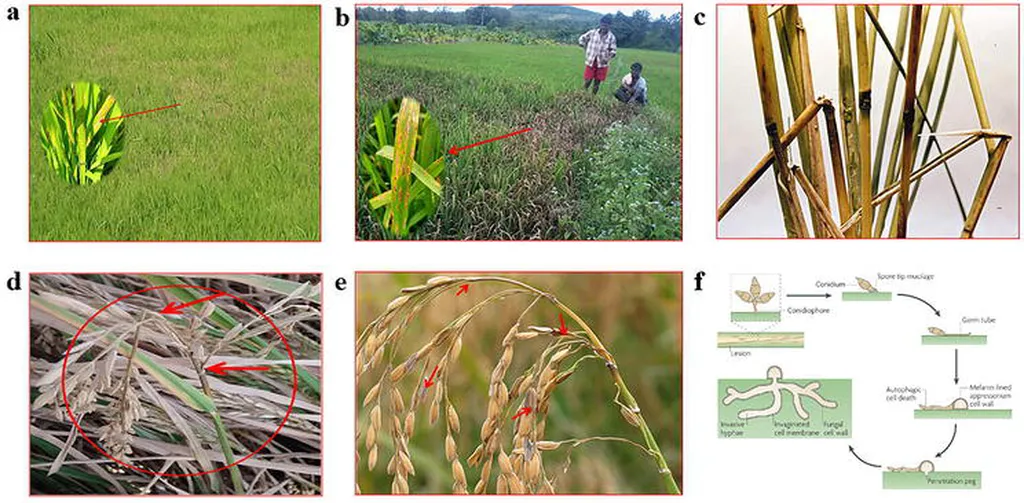In the heart of India’s agricultural landscape, a groundbreaking study led by Sravanthi Ragulakollu from the Department of Genetics and Plant Breeding at Tamil Nadu Agricultural University is reshaping the future of rice farming. The research, published in the esteemed journal *Frontiers in Plant Science* (which translates to “Frontiers in Plant Science” in English), delves into the intricate world of molecular breeding, offering new hope in the battle against rice blast disease, a menace that has long plagued global rice production.
Rice, a staple crop for over half the world’s population, faces a formidable foe in the fungal pathogen Magnaporthe oryzae, which causes blast disease. This pathogen is notorious for its rapid adaptation and ability to overcome plant defense mechanisms, leading to severe economic losses. “The dynamic nature of M. oryzae poses a significant threat to global food security and agricultural sustainability,” Ragulakollu explains. Traditional breeding methods, while foundational, have been hampered by their time-consuming nature and reliance on phenotypic selection, often requiring multiple generations to establish stable resistance traits.
Enter molecular breeding technologies. Tools like marker-assisted selection (MAS), marker-assisted backcross breeding (MABB), and quantitative trait locus (QTL) mapping have revolutionized resistance breeding, enabling more efficient and accurate identification and introgression of resistance genes (R genes). “These technologies have significantly accelerated and enhanced the precision of resistance breeding,” Ragulakollu notes.
The advent of genome engineering techniques, particularly CRISPR-Cas9, has been a game-changer. This technology allows for direct manipulation of resistance genes, enabling targeted editing and stacking of multiple genes for durable resistance. Omics technologies—genomics, transcriptomics, proteomics, and metabolomics—provide a comprehensive understanding of the molecular interactions between host and pathogen, facilitating the discovery of novel resistance mechanisms and regulatory pathways.
The integration of allele mining with advanced biotechnological tools has further promoted the development of cisgenic and intragenic plants. These plants incorporate resistance genes from related cultivars or wild species without introducing foreign DNA, addressing public concerns over transgenic crops. “These strategies not only enhance resistance but also help retain the desirable agronomic traits of elite rice varieties,” Ragulakollu adds.
Despite these advancements, the high mutation rate and genetic plasticity of M. oryzae remain a challenge. The pathogen can evolve and overcome resistance provided by single R genes. Understanding host–pathogen interactions at the molecular and cellular levels is crucial. Emerging technologies such as nanotechnology show promise in developing targeted fungicide delivery systems and innovative diagnostic tools. Synthetic biology opens avenues for constructing synthetic resistance pathways or deploying plant biosensors. Additionally, machine learning and artificial intelligence (AI) algorithms are increasingly used to predict disease outbreaks, model gene interactions, and optimize breeding strategies based on large datasets.
The commercial implications of this research are vast. Rice is a cornerstone of global agriculture, and any advancements in disease management can have ripple effects across the food supply chain. Enhanced resistance to blast disease can lead to higher yields, reduced crop losses, and increased profitability for farmers. This, in turn, can stabilize food prices and ensure food security for millions of people.
The synergy among conventional breeding wisdom, modern molecular tools, and emerging technologies holds promise for enhancing resistance durability and protecting global rice production against evolving fungal threats. As Ragulakollu and her team continue to push the boundaries of molecular breeding, the future of rice farming looks brighter and more resilient than ever before. This research not only offers valuable insights for sustaining resilient breeding programs against rice blast disease but also paves the way for innovative solutions in agricultural sustainability.

